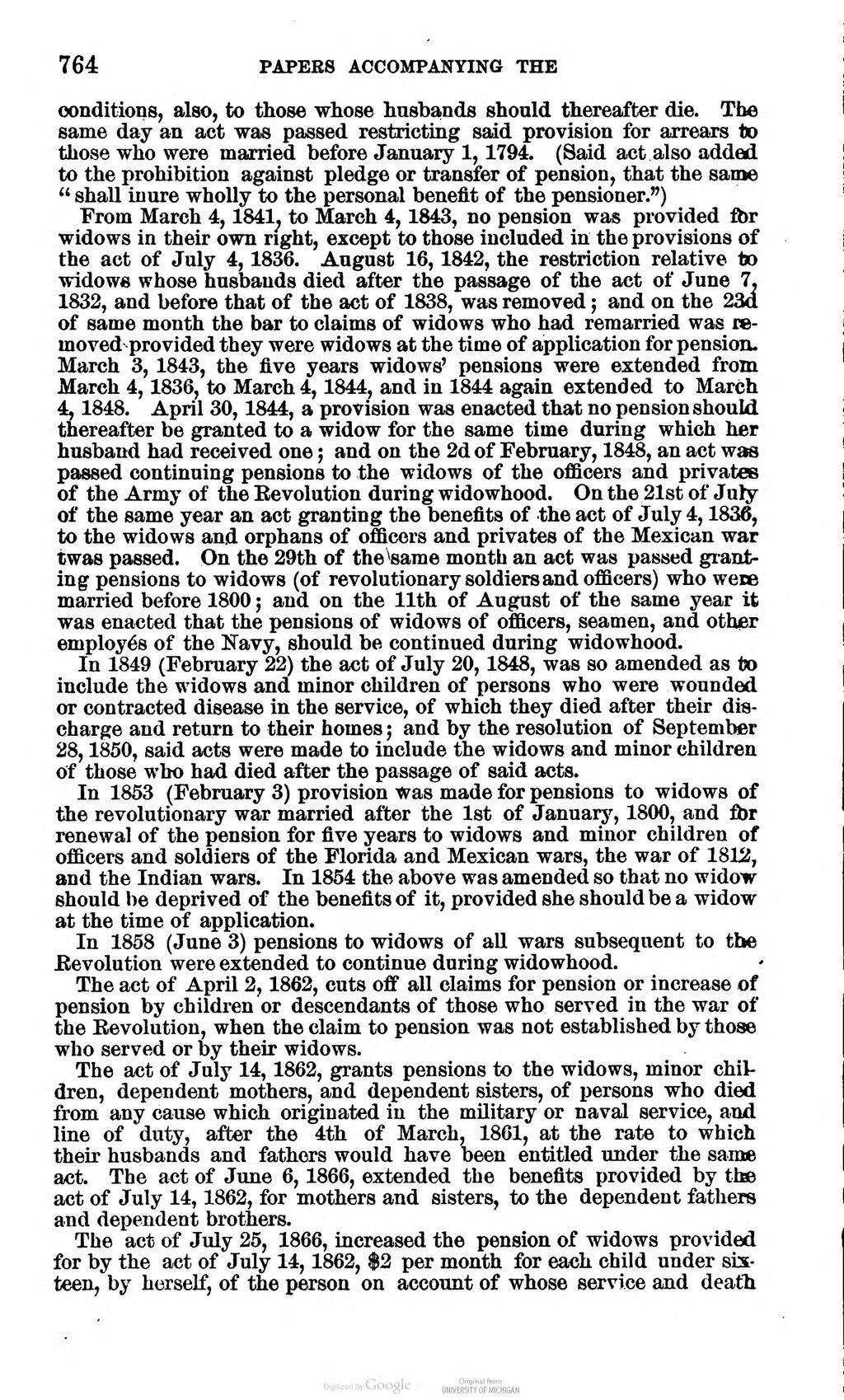conditions, also, to those whose husbands should thereafter die. The same day an act was passed restricting said provision for arrears in those who were married before January 1, 1794. (Said act also added to the prohibition against pledge or transfer of pension, that the same "shall inure wholly to the personal benefit of the pensioner.")
From March 4, 1841, to March 4, 1843, no pension was provided for widows in their own right, except to those included in the provisions of the act of July 4, 1836. August 16, 1842, the restriction relative to widows whose husbands died after the passage of the act of June 7 1832, and before that of the act of 1838, was removed; and on the 23d of same month the bar to claims of widows who had remarried was removed—provided they were widows at the time of application for pension. March 3, 1843, the five years widows' pensions were extended from March 4, 1836, to March 4, 1844, and in 1844 again extended to March 4, 1848. April 30, 1844, a provision was enacted that no pension should thereafter be granted to a widow for the same time during which her husband had received one; and on the 2d of February, 1848, an act was passed continuing pensions to the widows of the officers and privates of the Army of the Revolution during widowhood. On the 21st of J uly of the same year an act granting the benefits of the act of July 4,1836, to the widows and orphans of officers and privates of the Mexican war twas passed. On the 29th of the same month an act was passed granting pensions to widows (of revolutionary soldiers and officers) who were married before 1800; and on the 11th of August of the same year it was enacted that the pensions of widows of officers, seamen, and other employés of the Navy, should be continued during widowhood.
In 1849 (February 22) the act of July 20, 1848, was so amended as to include the widows and minor children of persons who were wounded or contracted disease in the service, of which they died after their discharge and return to their homes; and by the resolution of September 28, 1850, said acts were made to include the widows and minor children of those who had died after the passage of said acts.
In 1853 (February 3) provision was made for pensions to widows of the revolutionary war married after the 1st of January, 1800, and for renewal of the pension for five years to widows and minor children of officers and soldiers of the Florida and Mexican wars, the war of 1812, and the Indian wars. In 1854 the above was amended so that no widow should he deprived of the benefits of it, provided she should be a widow at the time of application.
In 1858 (June 3) pensions to widows of all wars subsequent to the Revolution were extended to continue during widowhood.
The act of April 2, 1862, cuts off all claims for pension or increase of pension by children or descendants of those who served in the war of the Revolution, when the claim to pension was not established by those who served or by their widows.
The act of July 14, 1862, grants pensions to the widows, minor children, dependent mothers, and dependent sisters, of persons who died from any cause which originated in the military or naval service, and line of duty, after the 4th of March 1861, at the rate to which their husbands and fathers would have been entitled under the same act. The act of June 6, 1866, extended the benefits provided by time act of July 14, 1862, for mothers and sisters, to the dependent fathers and dependent brothers.
The act of July 25, 1866, increased the pension of Widows provided for by the act of July 14, 1862, $2 per month for each child under sixteen, by herself, of the person on account of whose service and death
